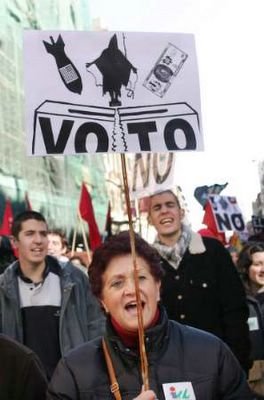AFTER THE BIG DAY, Arthur Chrenkoff is again with his superb roundup of good news from Iraq, now more than ever. Before going into what had happened the last two weeks, he goes through the big news:
It happened. And they did it.Arthur continues from there with all the good in the last two weeks.
In scenes unimaginable only two years ago - and scorned as impossible, undesirable and impractical for months - millions of ordinary Iraqi men and women braved terrorist violence and came out to vote for their future government (for a brief election fact file see here).
The first to vote were Iraqi expatriates around the world, who got the chance to cast their ballots two days before the election day in Iraq. And the first ones among the exiles were Iraqis in Australia. Kassim Abood, a senior adviser to the out-of-country voting program, told journalists outside a polling station in Sydney, "I think a lot of Iraqis are very proud today. People coming to me, shake (my) hand, hug me, kissing me and tell me 'congratulations', it's wonderful." The "Daily Telegraph" reported that "exiles danced in the street as they cast their ballots at nine polling stations in Australia. Turnout was high and some proudly displayed the blue ink on their fingers which proved that they had cast their ballots, calling it 'a mark of freedom'." You can also read this story of an Israeli who voted in the election. Overall, the International Organisation for Migration (IOM), which coordinated the overseas vote estimated that around 30% of Iraqis living outside of their country would have voted.
In Iraq, millions came out to vote, despite well-advertised threats of election day violence. Al Zarqawi promised that the streets would flow red with the blood of voters, and indeed at least 36 people around the country died in suicide, grenade and mortar attacks, but the color of the day was not blood red but the purple marking the forefingers of those who have cast their ballot.
As predicted, the turnout was highest in the Shia and Kurdish parts of the country, moderate in mixed areas and lowest in Sunni strongholds, but everywhere it exceeded expectations. The total turnout figures are preliminary at this stage; Farid Ayar, the spokesman for the Independent Electoral Commission says that around 60%, or 8 million, of those registered to vote did so. Earlier unconfirmed figures put the number even higher, at around 72%. Either figure puts to shame the average election turnout throughout the West where there is no danger that the journey to the polling station could be your last.
Throughout the Kurdistan, the turnout has been described as "very high". In Kurdish Erbil, the lines were lengthy and crowds turned up right from the start, despite the early morning chill. In Basra, a 90% turnout was reported. In other part of the Shia south, the enthusiasm was just as palatable: "Some rode on donkey-carts. Others piled into buses laid on for voters. Most came on foot, steadying the elderly and pushing the disabled in wheelchairs to the ballot box. Voters in Iraq's Shi'ite Muslim holy city of Najaf turned out in force on Sunday, many walking for kilometres through filthy streets, to cast their ballots in Iraq's first multi-party election in half a century... Some began trickling in as soon as the region's 240 polling centres opened at 7 a.m. By mid-morning queues of voters snaked around schools used as voting places, everyone holding their documents at the ready. 'It is a good feeling to experience democracy for the first time,' said Isra Mohammed, a housewife in the black Islamic robe traditionally worn by women in southern Iraq." 80-year Mahdeya Saleh had this to say: "I had often been forced to vote under Saddam Hussein. Today I come out of my own will to choose freely the candidate of my choice for the first and last time in my life."
Meanwhile, in Baghdad, one report observed: "With private vehicles banned to prevent car bombs, Iraqis took over the streets of Baghdad, playing soccer and going for walks - even those in wheelchairs were pushed along - as threats of catastrophic attacks failed to materialize. 'Why should I be afraid?' asked Arifa Abed Mohamed, an elderly woman in a black abaya, who was first to vote at dawn on one Baghdad polling station. 'I am afraid only from God'."
Long queues were reported throughout Baghdad's Sadr City. Elsewhere in the capital, "Western Baghdad polling stations were busy, with long queues of voters. Most went about the process routinely, filling in their ballots and leaving quickly without much emotion. Others brought chocolates for those waiting in line, and shared festive juice drinks inside the voting station. Samir Hassan, 32, who lost his leg in a car bomb blast in October, was determined to vote. 'I would have crawled here if I had to. I don't want terrorists to kill other Iraqis like they tried to kill me. Today I am voting for peace,' he said, leaning on his metal crutches, determination in his reddened eyes." Others went to great lengths to vote: "Determined not to be marginalized, a woman who gave her name only as Umm Ali, the mother of Ali, said she moved for three days out of Doura, a district on Baghdad's southern edge thick with insurgents, so she could vote in relative safety. 'I came here to relatives, because in Doura there are many [insurgent] operations,' says Umm Ali, in broken English. 'Everyone in my neighborhood had left to vote. I have no feeling of fear - Allah has won'."
Throughout Baghdad, the turnout (reported as high as 95%) disappointed the boycotters: "Asked if reports of better-than-expected turnout in areas where Sunni and Shiite Muslims live together indicated that a Sunni cleric boycott effort had failed, one of the main groups pushing the boycott seemed to soften its stance. 'The association's call for a boycott of the election was not a fatwa (religious edict), but only a statement,' said Association of Muslim Scholars spokesman Omar Ragheb. 'It was never a question of something religiously prohibited or permitted'."
While many areas throughout the Sunni triangle (like Tikrit or Samarra) were deserted, elsewhere throughout this restive area the democracy could not be completely kept down: "Even in Falluja, the Sunni city west of Baghdad that was a militant stronghold until a U.S. assault in November, a steady stream of people turned out, confounding expectations. Lines of veiled women clutching their papers waited to vote. 'We want to be like other Iraqis, we don't want to always be in opposition,' said Ahmed Jassim, smiling after he voted. In Baquba, a rebellious city northeast of Baghdad, spirited crowds clapped and cheered at one voting station. In Mosul, scene of some of the worst insurgent attacks in recent months, U.S. and local officials said turnout was surprisingly high."
To sample some of the joy of average Iraqis undiluted by the media, read Iraqi bloggers. Mohammed and Omar write in the aftermath of the vote: "We could smell pride in the atmosphere this morning; everyone we saw was holding up his blue tipped finger with broad smiles on the faces while walking out of the center. [We] couldn't think of a scene more beautiful than that." Read also blogger Ali's journey to the polling station. Blogger Zeyad writes: "My mother was in tears watching the scenes from all over the country." Aala wrote about "suicide bombers versus suicide voters;" the latter have won the day. Hammorabi reported on crowds demonstrating when some polling stations failed to open on time in Mosul. And the Friends of Democracy site is running first-hand reporting from around the country.
Overall, the election turned out to be not only less bloody than expected, but it also received a clean bill of health from observers: "A group that organized 10,000 independent observers said there had been little fraud. 'In general the elections went ahead in an excellent way and there was very little fraud or violations,' a spokesman for the Ain (Eye) non-governmental organisation said."
The results will not be known for 7 to 10 days. The election itself, however, is only a start of a long political journey for the people of Iraq. To find out what's in store in the near future, including drafting of the new constitution read this report.
Yesterday was the day of the ink-stained fingers and the long queues. What a great day.








